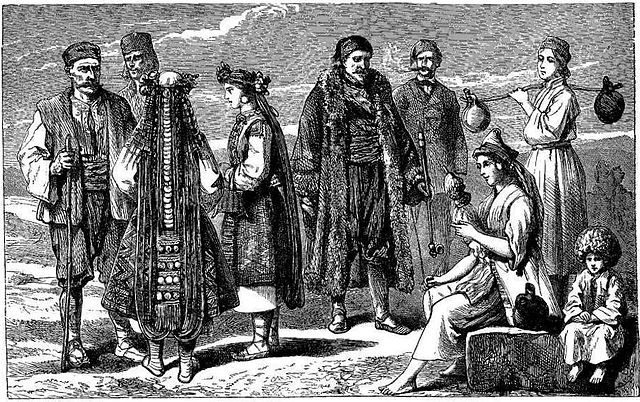Possible business formations is a matter regulated under Bulgarian Commercial Act. There are situated the rules with regards of incorporation, management, relation between shareholders and managers, insolvency, bankruptcy, liability and so on.
Issues not addressed in the Commercial Act are redirected to the general civil legislation of the Republic of Bulgaria.
Starting a business in Bulgaria is very easy and stress free, but which form may fit your needs. Well, that is what we will try in this post – to help you better understand the differences of possible business formations allowed by Bulgarian commercial legislation.
Normally these are business formations very similar to those known to other countries over the world. So let’s start with some general information.

19th century Bulgarian Merchants
The law defines the term Merchant as follows:
For the purposes of this Act a merchant shall mean any natural or legal person engaged by occupation in any of the following transactions:
1. purchasing goods or other chattels for the purpose of reselling them in their original, processed or finished form;
2. sale of one’s own manufactured goods;
3. purchasing securities for the purpose of reselling them;
4. commercial agency and brokerage;
5. commission, forwarding and transportation transactions;
6. insurance transactions;
7. banking and foreign-exchange transactions;
8. bills of exchange, promissory notes and cheques;
9. warehousing transactions;
10. license transactions;
11. supervision of goods;
12. transactions in intellectual property;
13. hotel operation, tourist, advertising, information, entertainment, impresario and other services;
14. purchase, construction or furnishing of real property for the purpose of sale;
15. leasing.
Merchants are as well:
1. Companies;
2. The cooperatives, except housing cooperatives.
3. Any person which has established a business, which in accordance with its purposes and volume requires that its activities be conducted on a commercial basis even if not listed under para 1, shall also be deemed a merchant.
Well, Who Are Not Merchants:
The following shall not be deemed merchants:
1. Natural persons engaged in farming;
2. Artisans, persons providing services through their own labor or members of the professions, except where their activity may be defined as a business within the meaning of Article 1, para 3;
3. Persons providing hotel services by letting rooms in their own home.
Every Merchant is obligated to keep accounts in accordance with Accountancy Act.
Well, finally we are ready to go with possible company formations.
SOLE PROPRIETOR (also known as SOLE TRADER)
Any natural person possessing capacity whose domicile is in the country may register as a sole proprietor, except the following:
1. who is bankrupt and his rights have not been restored;
2. who has intentionally gone bankrupt and has left unsatisfied creditors;
3. any person who has been convicted for fraudulent bankruptcy;
4. any person who has occupied the position of a manager, or an ex member of a managing or controlling body of a company that was suspended due to insolvency, in the last two years prior to the date of the decision to declare insolvency, in case there were unsatisfied creditors;
5. who had been manager, member of managerial or supervisory body of any company, in regard to which non-performance of obligations to constitute and hold stocks under the Crude Oil and Petroleum Products Stocks Act at levels, prescribed for it, had been ascertained by an effective penal decree.
A sole proprietor shall be registered on the basis of an application into Commercial Registrar.
SOLE PROPRIETOR liability is unlimited. He is responsible with all his assets, even personal – real estate, land, etc.
COMPANIES
There are two main group of companies based on their ownership:
1. PUBLIC ENTERPRISE MERCHANT – state owned or municipality
2. PRIVATE COMPANIES
PRIVATE COMPANIES
A company is an association of two or more persons for effecting commercial transactions with joint means. In cases provided by a law a company may be incorporated by one person. Companies are always legal persons – entity.
There are few types of companies provided be law:
1. General partnership;
2. Limited partnership;
3. Limited liability company;
4. Joint-stock company;
5. Partnership limited by shares;
6. Variable Capital Company.
GENERAL PARTNERSHIP
A general partnership shall be a company formed by two or more persons for the purpose of effecting commercial transactions by occupation under a joint trade name. The partners shall be liable jointly and severally and their liability shall be unlimited.
A partnership’s articles shall be drawn up in writing with notarized signatures of the partners.
Each partner shall be entitled to take part in the management of the partnership’s business, except when management has been assigned with the articles of partnership to one or several of the partners or to a third party.
When taking an activity against the partnership the claimant may also name as defendants one or more of the partners. Forcible execution shall be directed first against the partnership, and, in case of impossibility for satisfaction, against the partners.
Second Part should be available soon and will cover:
Limited partnership;
Limited liability company;
Joint-stock company;
Partnership limited by shares;
Variable Capital Company.
This article was updated on 30.11.2023.










